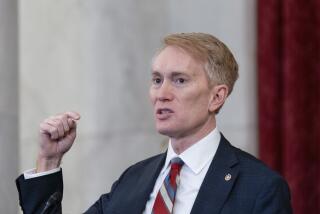Bush to Make Plea for Medicare Drug Bill
- Share via
WASHINGTON — After weeks of working behind closed doors and through top aides, President Bush plans Wednesday to make a public push for a Medicare prescription drug bill.
White House officials on Monday said only that Bush would use his Rose Garden remarks to continue urging Congress to “move forward on this priority.”
But that may not be enough to wring an agreement out of the lawmakers who have been working for months to fashion a compromise bill that could pass the House and Senate.
For weeks, they have called on the president to abandon his above-the-fray stance and get personally involved in hashing out specific differences.
Administration officials defended their strategy Monday, saying it had “kept us in the room” to influence negotiations. “The endgame is afoot,” said Health and Human Services Department spokesman Bill Pierce.
But with Congress planning to adjourn in November for the rest of the year, time is running out. And with Bush’s public approval ratings slipping on domestic issues, GOP strategists are encouraging Republican leaders to show voters they can get the job done on Medicare.
“We want to be able to say that more people’s problems are being taken care of as a result of what we did,” GOP pollster David Winston said he was telling top Republican lawmakers.
In meetings Monday, negotiators continued to work through differences in the bills passed June 27 by the House and Senate. House Republicans insist on including some form of competition between Medicare and private health plans. They also want a mechanism to ensure that the government’s Medicare spending does not spiral out of control. Senate Democrats strongly oppose any plan involving competition that would increase medical costs for seniors and disabled people.
As negotiators began focusing last week on the key sticking points, Democrats called on Bush to immerse himself in the legislative details.
“We want to see more engagement on the part of the administration and the president himself,” said Senate Minority Leader Tom Daschle (D-S.D.). “The president can solve this problem.”
Asked about Bush’s role, Rep. Bill Thomas (R-Bakersfield), chairman of the House-Senate conference committee, said Friday that having Health and Human Services Secretary Tommy G. Thompson and Medicare administrator Thomas A. Scully in the meeting room with negotiators was the same as “having the president involved.”
“We are working closely with Congress,” White House Press Secretary Scott McClellan said Monday. “This is a real opportunity to once and for all get this passed.”
But Scott Reed, a Republican strategist, said that if Bush got more involved in the nitty-gritty of Medicare reform, his political capital with lawmakers would be enough to push through an agreement.
“I wouldn’t say his leadership is on the line,” Reed said. “But the Republicans do control the White House and do control Congress. And a part of that is governing. At this White House, when they put their shoulders to the wheel, they get things done.”
Both Republican and Democratic strategists see potential for political gain in a Medicare prescription drug bill. Roughly one-fifth of voters are seniors, and many have been clamoring for years for Medicare prescription drug coverage.
Beyond that, however, political strategists realize that the specifics of a Medicare reform bill -- less than total drug coverage and changes that could increase seniors’ costs -- could ultimately hurt their candidates.
“There is a lot of concern among Republicans about polling data showing that seniors don’t like the [House] bill,” said GOP pollster Bill McInturff.
Democratic pollster Celinda Lake is encouraging Democratic candidates to highlight their efforts to control the cost of prescription drugs.
More to Read
Get the L.A. Times Politics newsletter
Deeply reported insights into legislation, politics and policy from Sacramento, Washington and beyond. In your inbox twice per week.
You may occasionally receive promotional content from the Los Angeles Times.










